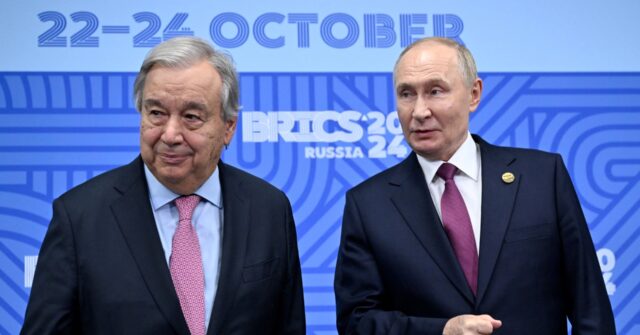United Nations Secretary-General Antonio Guterres was among the guests of honor at this week’s BRICS summit, holding a one-on-one meeting with the leader of the host nation, Russian strongman Vladimir Putin.
The meeting was a diplomatic victory of Putin, whose government leveraged its leadership of the anti-American BRICS bloc this year to dispel the image of an isolated and weakened Russia after over a decade of attempts to colonize Ukraine that began with the “annexation” of Crimea in 2014.
Russia has been engaging in an active invasion of Ukraine since February 2022, which it refers to as a “special operation” to topple the “Nazi” Ukrainian government, led by the nation’s first Jewish President Volodymyr Zelensky.
Zelensky and his administration responded with disgust to Guterres attending the BRICS summit, noting that the U.N. chief did not attend a Ukrainian-organized “peace summit” in June and calling granting the prestige of his presence to the BRICS coalition a “wrong choice.” Guterres’s office insisted that he addressed what he referred to as the illegality of the Ukraine invasion with Putin personally, but his public comments in his speech to the summit mentioned only a need for “peace” in Ukraine generally, without issuing blame on Russia for invading the country.
BRICS is an economic and geopolitical influence association named for its core members: Brazil, Russia, India, China, and South Africa. In January, it accepted four more members: Iran, the United Arab Emirates (UAE), Ethiopia, and Egypt. A fifth, Saudi Arabia, received an invitation but has yet to responded either way to it. The objective of the BRICS alliance nominally is to elevate the voices of the “global south,” a contingent of countries typically left out of the dominant Western order, but in reality its activities typically take the form of opposing the post-World War II global structures, undermining American national interests, and weakening global human rights standards.
Russia hosted the annual BRICS summit this year in Kazan, the regional capital of Tatarstan.
According to a readout published by the United Nations, Guterres used his time with Putin to note that his invasion of Ukraine violated United Nations standards.
“The Secretary-General reiterated his position that the Russian invasion of Ukraine was in violation of the United Nations Charter and international law,” the readout detailed. “He further underlined United Nations support for peace, in line with the remarks he delivered at the BRICS summit.”
Guterres also claimed that “establishing freedom of navigation in the Black Sea is of paramount importance for Ukraine, the Russian Federation and for the world’s food and energy security.”
The readout added that Guterres also called for Israel to stop attacking Hamas, Hezbollah, and other Iran-backed terrorists in Gaza and Lebanon and “development” generally.
Russian President Vladimir Putin (R) greets United Nations (UN) Secretary General Antonio Guterres during their bilateral meeting on the sidelines of the BRICS summit in Kazan on October 24, 2024. (ALEXANDER NEMENOV/POOL/AFP via Getty Images)
The Kremlin confirmed the meeting but its official readout of the meeting offered no details on its contents.
Guterres’s address to the BRICS coalition, as published by the United Nations, did not directly condemn Russia for the invasion of Ukraine. The U.N. chief declared that the world must “strengthen and update the machinery of peace” in general, listing Ukraine alongside several conflicts active today.
“We need peace in Gaza with an immediate cease-fire, the immediate and unconditional release of all hostages, the effective delivery of humanitarian aid without obstacles,” Guterres said, “nd we need to make irreversible progress to end the occupation and establish the two state solution, as it was recently reaffirmed once again by a UN General Assembly resolution.”
“We need peace in Ukraine. A just peace in line with the UN Charter, international law and General Assembly resolutions,” he added. “We need peace in Sudan, with all parties silencing their guns and committing to a path towards sustainable peace.”
The Ukrainian Foreign Ministry made its displeasure with Guterres clear.
“The U.N. secretary-general declined Ukraine’s invitation to the first global peace summit in Switzerland. He did, however, accept the invitation to Kazan from war criminal Putin,” the ministry said in a statement. “This is a wrong choice that does not advance the cause of peace. It only damages the U.N.’s reputation.”
The “global peace summit” was an event in June in which Ukraine discussed with friendly parties its hopes to dismantle the Russian war machine and end the invasion. Neither Russia nor any of its prominent allies attended the summit, leading to no significant results or meaningful discussion. Zelensky said after the summit that, should he host a second one, he would hope to see Russian representatives in attendance.
On Friday, Zelensky declined to confirm that, should Guterres seek to visit Kyiv, he would receive a welcome from the president. The statement followed a speech by the president on Thursday, “United Nations Day,” condemning Guterres.
“Today, the goal for which the UN was created is defended not by the UN Security Council and not even by UN officials, but by collaborative formats such as the Crimea Platform or the Peace Summit,” Zelensky declared. “And I would really like to remind the international bureaucracy and political leaders that today is the UN Day all over the world, not somewhere in Kazan.”
“And now, as some state leaders gathered at Putin’s summit in Kazan, and as military personnel from North Korea can actually be moved closer to the front in Ukraine,” he continued, “alongside their summit, accompanied by words about allegedly ‘preventing tension,’ we still know: it is not the criminal who will prevail, not the one who destroys and deports, but the one who unites peoples based on fundamental human values and the UN Charter.”



